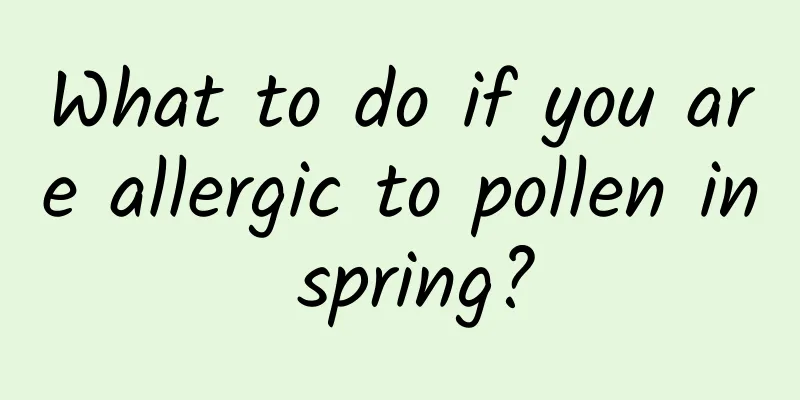What to do if you are allergic to pollen in spring?

|
Flowers bloom in spring, and pollen and other allergens are more abundant. Although flowers are beautiful, they may cause inconvenience to the travel and life of those who are allergic to pollen, such as discomfort to some sensitive people. Allergic symptoms can last for 1-2 months. one What is pollen allergy? Pollen is the male reproductive cell of various plants. Pollen allergy refers to the allergic reaction after someone inhales pollen, which is also called pollen allergy. It is a series of pathological and physiological processes caused by atopic patients being sensitized by pollen. Pollen allergy is a common disease in allergy department, and the incidence rate is increasing year by year, which seriously affects human health. It mainly manifests as catarrhal inflammation of the respiratory tract and conjunctiva, which may be accompanied by lesions of the skin and other organs. two What are the symptoms of pollen allergy? When you are allergic to pollen, you may experience a variety of symptoms, including itchy nose, sneezing, runny nose, nasal congestion, difficulty breathing, paroxysmal coughing in the respiratory tract, chest tightness, shortness of breath, wheezing, white mucus, sudden asthma attacks, itchy eyes, swollen eyelids, often accompanied by watery or pus secretions, redness and itching of the skin, etc. In severe cases, rashes may occur and even exudate may form. three What are the characteristics of pollen allergy? 1. Seasonality: coincides with the peak concentration of pollen in the air. 2. Recurrence: occurs every year. (III) Rapid onset: It comes and goes quickly and can occur acutely. (IV) Familial: There is often a family history of allergies. (V) Effectiveness: The medication is effective and has immediate results. Taking Beijing as an example, there are two peak periods of air pollen concentration throughout the year. One is in spring from March to May, dominated by plants such as Ulmaceae, Betula, Cupressaceae, Salicaceae, and Pinaceae. These plants grow flower petals before growing green leaves. The flower petals contain a large number of pollen particles that are dispersed by the wind. The other is in autumn from August to September, dominated by plants such as Asteraceae, Artemisia genus, Chenopodiaceae, Moraceae, and Poaceae. Four What are the commonly used anti-allergy drugs? When exposure cannot be avoided, antiallergic drugs are needed. For patients with persistent and obvious nasal symptoms, glucocorticoid nasal sprays are generally effective, and second-generation glucocorticoid nasal sprays can be given priority when conditions permit. Other treatments can be taken as prescribed by the doctor, such as leukotriene modifiers and ipratropium bromide. five How to prevent and deal with pollen allergies scientifically? First, avoid direct contact with pollen sources. Reducing the time spent outdoors is the most effective protective measure. If you need to go out or exercise outdoors, you should pay attention to the recent pollen concentration before going out. When the pollen concentration is high, you should strengthen personal protection and try to avoid long-term exposure. Try to go out in the early morning, at night, or after rain when the pollen concentration is low. Wear disposable medical masks, hats, goggles, and long-sleeved clothes to avoid direct contact with pollen and catkins. Secondly, try to avoid pollen from entering the house. When the outdoor pollen concentration is high, you also need to reduce the window opening time, clean or spray water to humidify the indoor flying catkins in time, use a vacuum cleaner to clean in time and use an air purifier to reduce the entry of outdoor pollen. Third, we must strengthen personal health protection. After going out and coming home, remember to wash your hands and face, clean your nose and eyes with diluted salt water when necessary, and change clothes that are stained with pollen. Fourth, you can consider seeking drug support. For example, you can choose to use anti-allergic drugs in the first two weeks of the pollen season. It is best to bring desensitization drugs when going out. If you experience itchy skin, fever, cough, and shortness of breath, you should quickly leave the inducing environment and take medicine in time. Once asthma symptoms appear, take medicine quickly and go to the hospital for treatment in time. Residents with allergic symptoms can make an appointment with the hospital's allergy department or allergy department to seek professional treatment. Finally, you should pay attention to a light diet, drink plenty of water, eat more fruits, vegetables and other foods, and eat less spicy and irritating foods. Source: China CDC News |
<<: Take 3 minutes to determine whether your breasts are healthy?
>>: What have 3.9 billion women gone through to achieve "menstrual freedom"?
Recommend
How to screen for the 9 most common cancers? The more expensive, the better!
Source: Youlai Healthy Life...
What are the symptoms of getting angry during pregnancy?
It is very harmful to the body of pregnant women ...
Symptoms of early pregnancy: bloody vaginal discharge
The bodies of women during pregnancy are differen...
What to do if the anterior wall of the uterus is thin
The anterior wall of the uterus is a structure ne...
What foods are suitable to eat during menstruation?
I believe all women know that due to physiologica...
Use vaginal tightening to discharge like tofu dregs
Nowadays, women pay more attention to maintenance...
What's going on when the ultrasound is clean and there is blood 30 days after the medical abortion?
Some women get pregnant accidentally, but have to...
What is vulvar pruritus?
Women's bodies are most susceptible to bacter...
I have a physical examination every year, and my blood lipids are getting higher and higher! Thin people and children may also have high blood lipids...
Content from : Gu Zhuowei Renji Hospital Affiliat...
Why does a woman's menstrual period last so long?
Since we entered puberty, menstruation has become...
What does it mean when my ex-boyfriend comes to my QQ space after breaking up? What does it mean when my ex-boyfriend comes to my space every day?
After a breakup, you accidentally discovered that...
What's wrong with women who keep going to the toilet to urinate?
Urinating is a very normal physiological activity...
Virus expert HPV reveals: Two "magic weapons" made me "unemployed"
Author: Zhao Qun, deputy chief physician of the T...
Are you afraid of bumps during early pregnancy?
During pregnancy, the body is relatively heavy, a...
What to do if there is pain above the breast and below the collarbone
It is normal for women to experience breast pain....









